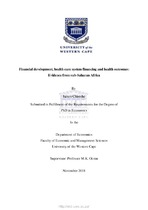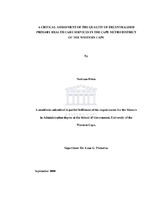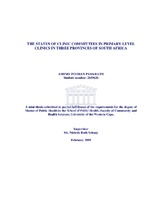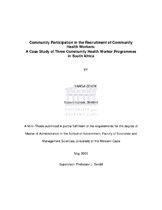Financial development, health care system financing and health outcomes: Evidence from sub-Saharan Africa
Abstract
This thesis purposes to examine the impact of financial development on health outcomes, health care expenditure and financial protection in health in 46 selected sub-Saharan African (SSA) countries from 1995 to 2014. It also estimates the impact of health care expenditure on health outcomes. The thesis is premised on the hypothesis that health care expenditure is a critical transmission mechanism through which financial development leads to better health outcomes. The health care expenditure channel is conspicuously absent in the literature on financial development and health outcomes; hence the need for this study to fill the gap in the literature. The thesis explores the effects of both depth and access dimensions of financial development on health outcomes, expenditure and financial protection. Throughout the study, financial access is measured by the number of automated teller machines (ATMs) and commercial bank branches per 100 000 people, while financial depth is measured by the proportion of broad money and bank credit to the private sector, to Gross Domestic Product (GDP). The study uses fixed and random effects and the Two-Stage Least Squares estimation approaches. The Generalised Method of Moments (GMM) is also used to estimate the impact of health care expenditure and health outcomes given the absence of valid instrumental variables. The results of the regression analyses show that financial development leads to increased health care expenditure and health outcomes. The analysis also shows that health care expenditure leads to better health outcomes. Additionally, the study indicates that financial development leads to financial protection in health care by reducing out-of-pocket health care expenditure. Well-developed financial systems provide financial protection from the risk of catastrophic health care expenditure and impoverishment resulting from illness. The study shows that health care systems financed through prepaid mechanisms reduce neonatal, infant and under-five mortality rates and increase life expectancy, while those relying on out-of-pocket expenditure have adverse effects on health outcomes.
Collections
Related items
Showing items related by title, author, creator and subject.
-
A critical assessment of the quality of decentralised primary health care services in the cape metro district of the Western Cape
Peton, Neshaan (2009)The complex and multi-facet decentralisation process of Primary Health Care services in the Cape Metro District of the Western Cape will be critically assessed in this thesis. Primary Health Care is the provision of ... -
The status of clinic committees in primary level clinics in three provinces in South Africa
Padarath, Ashnie Pooran (University of the Western Cape, 2009)In South Africa, governance structures in the form of clinic committees, hospital boards and district health councils are intended to provide expression to the principle of community participation at a local and district ... -
Community participation in the recruitment of community health workers: a case study of the three community health worker programmes in South Africa
Zembe, Yanga (University of the Western Cape, 2009)This research investigates the nature and extent of community participation and involvement in the recruitment and selection processes for Community Health Workers (CHWs), primarily through detailed case studies of three ...




